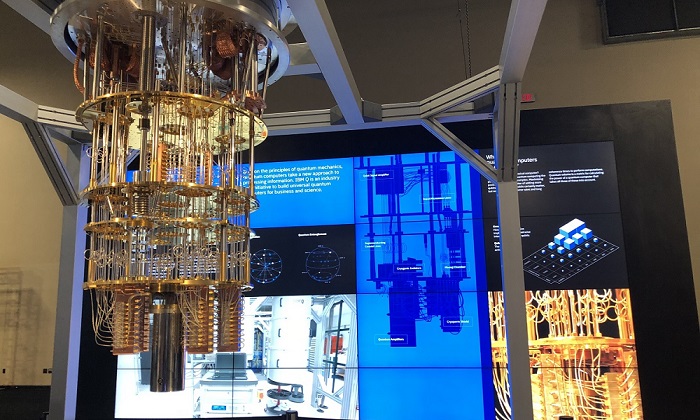Last Thursday the U.S. House of Representatives passed the National Quantum Initiative Act (NQIA) intended to accelerate quantum computing research and development. Among other things it would establish a National Quantum Coordination Office within the White House Office of Science and Technology Policy to oversee a “whole-of-government” effort. A companion bill is under consideration in the U.S Senate. Meanwhile another proposal, the Quantum Computing Research Act (QCRA), was introduced in the Senate in June and directs DoD to form a Defense Quantum Information Consortium.
Sorting through the various quantum computing efforts in Congress can be confusing. Bipartisan support from House Committee on Science, Space and Technology chairman Lamar Smith (R-TX) and ranking member Eddie Bernice Johnson (D-TX) helped speed the NQIA effort through the House. The bill has backers from industry and academia and comes at a time when the global race in quantum computing is heating up despite the admittedly nascent stage of the technology. In total, the House bill calls for $1.275 billion in funding for the National Quantum Initiative during its first five years but makes no provisions for funding the next five years.
Intel likened pursuit of leadership in quantum computing to a “modern day space race” and Jim Clarke, director of quantum hardware, Intel Labs, issued a statement in support: “This legislation will allocate funding for public research in the emerging area of Quantum Computing, which has the potential to help solve some of our nation’s greatest challenges through exponential increases in compute speed. [We] look forward to working with leaders in the Senate to help keep the U.S. at the cutting edge of quantum information science and maintain the economic advantages of this technological leadership.”

Judging the state of quantum technology remains challenging. (For an overview see HPCwire article, Hyperion Tackles Elusive Quantum Computing Landscape; full text of the NQIA may be found here). The NQIA is broad in scope and directs the President to:
- “establish the goals, priorities, and metrics for a 10-year plan to accelerate development of quantum information science and technology applications in the United States;
- “invest in fundamental Federal quantum information science and technology research, development, demonstration, and other activities to achieve the goals established in paragraph;
- “invest in activitiesto develop a quantum information science and technology workforce pipeline;
- “provide for interagency coordination of Federal quantum information science and technology research, development, demonstration, and other activities undertaken pursuant to the Program;
- “partner with industry and academia to leverage knowledge and resources;
- “leverage existing Federal investments efficiently to advance Program goals and objectives.
As spelled out in the bill, 1) National Institute of Standards and Technology (NIST) Activities and Workshops would receive $400 million (2019-2023 at $80 million per year); 2) National Science Foundation (NSF) Multidisciplinary Centers for Quantum Research and Education would receive $250 million (2019-2023, at $50 million per year); and 3) Department of Energy Research and National Quantum Information Science Research Centers would receive $625 million (2019-2023 at $125 million per year). These numbers will have to be reconciled with what the Senate passes, and then actually get appropriated.
“The Quantum Industry Coalition strongly supports the NQI Act and is working to help get it to the President’s desk. My understanding is that right now it’s a matter of negotiations between the Senate Commerce and Energy and Natural Resources Committees, with the House participating in the discussions as well; the Senate is aiming to pass a compromise that the House can then pass, with a goal of getting everything done before the end of the year,” said Paul Stimers, a partner in K&L Gates and an organizer of the quantum industry lobbying group.
The second major bill, the Quantum Computing Research Act of 2018, is focused on DoD and calls for, “alignment of effort within the United States government, academic, and private sectors are vital to ensuring the best technology is made available for the defense of the United States; and to the extent possible to protect national security, work performed under section 3 should be maintained at the lowest possible classification level to promote coordination between consortium partners and growth within the field of quantum information science.”
Introduced in June by Sen. Kamala Harris (D-CA), it directs the Secretary of Defense to establish the Consortium composed of members (academia and industry) selected by the Chiefs of U.S. Naval and Army research and supported by a board which would include member of the National Quantum Initiative. From a first reading of the bill it looks actual work would be supported by issuing grants.
Links to recent quantum computing coverage in HPCwire:
Rigetti (and Others) Pursuit of Quantum Advantage
NSF Ramps Quantum Investment, Tabs up to $25M for Q-AMASE-i Foundry Program
STAQ(ing) the Quantum Computing Deck
D-Wave Breaks New Ground in Quantum Simulation
Chinese Scientists Set Record for Quantum Entanglement
Scientists Conduct First Quantum Simulation of Atomic Nucleus
Spring Meetings Underscore Quantum Computing’s Rise
Quantum Network Hub Opens in Japan
Google Charts Two-Dimensional Quantum Course




























































